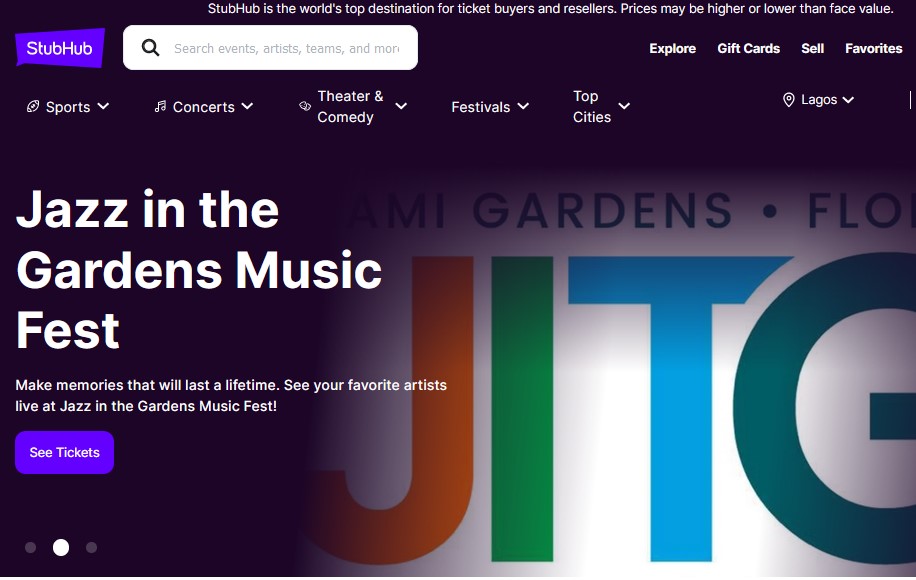You’ve probably encountered StubHub while searching for tickets to that must-see concert, playoff game, or Broadway show. As one of the leading names in the ticket reselling industry, the platform promises to connect fans with sellers offering tickets to the hottest events.
But a quick search online reveals a darker side. There’s no shortage of horror stories from buyers who felt scammed, tricked into paying top dollar for fake, duplicated, or non-existent tickets.
With tales of shattered dreams and empty pockets, it’s only natural to ask yourself: Is StubHub really a scam? Let’s take a deep dive and uncover the harsh truth behind this ticketing giant.
You might also like: Is Bruno Mars Concert Singapore Legit?
Quick Overview of StubHub Scam
On the surface, StubHub operates on a brilliantly simple premise. It provides a platform for people to resell tickets they can no longer use to others who are willing to pay for the opportunity to attend their desired event.
Rather than having tickets go to waste, StubHub allows sellers to recoup some of their costs while providing buyers a second chance to snag those elusive seats. It’s a win-win situation, or so it seems.
However, like many great ideas, the reality of StubHub’s operations is far more nuanced and prone to complications. By acting as a middleman between buyers and sellers, StubHub introduces a layer of abstraction that can breed confusion, misunderstandings, and unfortunately, opportunities for unscrupulous actors to take advantage.
Authentic Tickets or Counterfeit Nightmares?
One of the most significant concerns surrounding StubHub is the authenticity of the tickets being sold on the platform. Unlike purchasing directly from the venue or an authorized seller, buyers on StubHub are essentially taking a leap of faith that the seller is offering genuine, valid tickets.
Tales abound of unsuspecting fans shelling out hundreds or even thousands of dollars, only to show up at the venue and have their hopes crushed when the tickets are rejected as counterfeits or duplicates.
While StubHub does have measures in place to prevent such occurrences, the decentralized nature of the platform means that the company is effectively trusting sellers to be honest about the tickets they’re listing.
Unfortunately, as with any online marketplace, there will always be bad actors looking to game the system and make a quick buck at the expense of others.
These scammers may use sophisticated methods to create convincing fake tickets, or they may simply list tickets they don’t actually possess, disappearing with the buyers’ money once the transaction is complete.
The “Too Good to Be True” Trap
Another common pitfall on StubHub is the allure of deals that seem too good to be true. We’ve all seen them – tickets to a sold-out show being offered at a fraction of their face value. In the excitement of potentially snagging a bargain, it’s easy to let your guard down and overlook the red flags.
These too-good-to-be-true deals are often the bait used by scammers to lure in unsuspecting victims. The tickets may be completely fake, or they may be legitimate but for an entirely different event or venue.
In some cases, the scammer may even deliver tickets, but for obstructed or undesirable seats that in no way match the listing.
It’s a harsh lesson in the adage that if something seems too good to be true, it probably is. While it’s tempting to jump on what appears to be an amazing deal, it’s crucial to exercise caution and thoroughly research both the seller and the listing before parting with your hard-earned money.
The Duplicate Dilemma
Even if you manage to avoid outright scams and counterfeit tickets, there’s another pitfall that can derail your StubHub experience: duplicate listings. In this scenario, a seller lists the same set of tickets multiple times, effectively overselling the same seats to different buyers.
When it comes time for the event, only the first buyer to arrive will be granted entry, leaving the rest holding worthless duplicate tickets and facing a night of disappointment.
While StubHub does have policies in place to prevent duplicate listings, enforcing these rules can be a challenge given the sheer volume of transactions taking place on the platform.
It’s a situation that highlights the inherent risks of operating in a decentralized marketplace, where the company is reliant on the honesty and integrity of its sellers.
The Hidden Costs and Fees
Aside from the potential for outright scams, StubHub has also faced criticism for its fee structure and lack of transparency around pricing. While the platform may advertise tickets at seemingly reasonable prices, buyers are often hit with a barrage of additional fees and charges once they reach the checkout stage.
From service fees to delivery charges and more, these hidden costs can add a significant markup to the advertised price, leaving buyers feeling misled and resentful.
It’s a practice that has drawn the ire of consumer advocacy groups and lawmakers alike, with some jurisdictions even taking legal action against StubHub for allegedly misleading pricing practices.
The Elusive Nature of Accountability
At the heart of many StubHub horror stories lies a fundamental issue: the lack of true accountability within the platform’s ecosystem. When things go wrong, whether it’s a case of counterfeit tickets, duplicate listings, or hidden fees, buyers often find themselves in a frustrating game of finger-pointing between StubHub and the sellers.
StubHub’s role as a middleman means that they can effectively distance themselves from the actions of individual sellers, leaving buyers feeling stranded and without recourse.
While the company does offer buyer protection policies and promises to make things right in cases of fraud or misconduct, the process of actually resolving issues can be a bureaucratic nightmare, with buyers forced to navigate a maze of customer service representatives and convoluted policies.
The Pandemic Pandemonium
The COVID-19 pandemic served as a harsh stress test for StubHub’s operations and customer service, with countless events being canceled or postponed indefinitely.
As fans sought refunds for tickets they could no longer use, StubHub found itself overwhelmed and ill-prepared to handle the deluge of requests.
Reports emerged of buyers being stonewalled, given the runaround, or even outright denied refunds despite the platform’s stated policies. The situation highlighted the company’s apparent lack of contingency planning and inability to adapt to rapidly changing circumstances.
For many, the pandemic debacle was the final straw, eroding what little trust remained in StubHub’s ability to put the needs of its customers first.
The Courtroom Battles
In response to the mounting criticism and allegations of unfair practices, StubHub has found itself embroiled in a series of legal battles across various jurisdictions.
From class-action lawsuits alleging deceptive pricing and hidden fees to regulatory crackdowns on its operations, the company has been forced to defend its business model and practices in the courtroom.
While the outcomes of these legal battles remain uncertain, they serve as a poignant reminder that even industry giants are not immune to scrutiny and accountability when it comes to protecting consumer rights.
The Battle for Transparency and Fair Play
Despite the numerous controversies and criticisms leveled against StubHub, the platform remains a popular choice for many fans seeking tickets to sold-out events. However, the company’s future success may hinge on its ability to address the trust deficit that has plagued its operations.
Calls for increased transparency, clearer pricing structures, and more robust seller verification processes have grown louder, with consumer advocacy groups and regulators alike pushing for reforms that prioritize fair play and consumer protection.
Ultimately, the onus is on StubHub to demonstrate a genuine commitment to addressing the systemic issues that have enabled scams, deception, and unfair practices to flourish on its platform.
By embracing accountability, implementing stronger safeguards, and fostering an environment of trust and transparency, StubHub has an opportunity to shed its tarnished image and truly live up to its promise of connecting fans with legitimate ticket sellers.
Only then can the platform hope to regain the confidence of consumers and cement its position as a trusted and reliable player in the ticketing industry.
The Verdict: Is StubHub Scam or Legit?
So, is StubHub really a scam, or is it simply a misunderstood platform plagued by bad actors and systemic issues? The truth, as is often the case, lies somewhere in the middle.
While StubHub itself is a legitimate business operating within the bounds of the law, the decentralized nature of its operations and the inherent trust required between buyers and sellers has created an environment ripe for exploitation.
From outright scams and counterfeit tickets to deceptive pricing practices and a lack of accountability, the platform has undoubtedly experienced its fair share of controversy and criticism.
However, to dismiss StubHub entirely as a scam would be an oversimplification. For all its faults and shortcomings, the platform has also facilitated countless successful ticket transactions, connecting fans with legitimate sellers and enabling unforgettable experiences.
The key, as with any online marketplace, is for buyers to exercise caution, conduct thorough research, and approach each transaction with a healthy dose of skepticism.
By remaining vigilant, understanding the risks, and taking advantage of available buyer protection measures, fans can navigate the StubHub landscape and find legitimate ticket deals without falling victim to scams or deceptive practices.
Ultimately, the responsibility lies not only with StubHub to address the systemic issues that enable scams and unfair practices but also with buyers to educate themselves and make informed decisions.
Only through a combination of increased transparency, accountability, and consumer awareness can the ticketing industry as a whole move towards a more trustworthy and equitable future.
In the meantime, the StubHub saga serves as a cautionary tale, reminding us that even the most innocuous transactions can harbor hidden dangers in the digital age. Approach with caution, stay vigilant, and never let your guard down when chasing those coveted tickets to your dream event.
Also Read: How to Check if Viagogo Tickets are Valid (The 2024 Guide)

